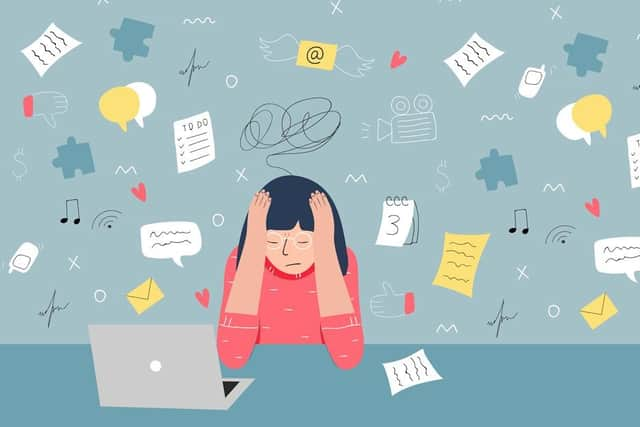What are the best ways to reduce heightened stress levels?
and live on Freeview channel 276
If you're stressed, whether by your job or something more personal, the first step to feeling better is to identify the cause.
The most unhelpful thing you can do is turn to something unhealthy to help you cope, such as smoking or drinking, according to NHS guidelines.
"In life, there's always a solution to a problem," says Professor Cary Cooper, an occupational health expert at the University of Lancaster.
Advertisement
Hide AdAdvertisement
Hide Ad"Not taking control of the situation and doing nothing will only make your problems worse.”
These are Professor Cooper's top 10 stress-busting suggestions:Be active
Exercise won't make your stress disappear, but it will reduce some of the emotional intensity that you're feeling, clearing your thoughts and letting you deal with your problems more calmly.
Connect with people
A good support network of colleagues, friends and family can ease your work troubles and help you see things in a different way.
Advertisement
Hide AdAdvertisement
Hide Ad"If you don't connect with people, you won't have support to turn to when you need help," says Professor Cooper.
The activities we do with friends help us relax. We often have a good laugh with them, which is an excellent stress reliever.
Have some 'me time'


Here in the UK, we work the longest hours in Europe, meaning we often don't spend enough time doing things we really enjoy.
"We all need to take some time for socialising, relaxation or exercise," says Professor Cooper.
Advertisement
Hide AdAdvertisement
Hide AdHe recommends setting aside a couple of nights a week for some quality "me time" away from work.
Avoid unhealthy habits
Don't rely on alcohol, smoking and caffeine as your ways of coping.
In the long term, these crutches won't solve your problems. They'll just create new ones.
"It's like putting your head in the sand," says Professor Cooper. "It might provide temporary relief, but it won't make the problems disappear."
Help other people
Advertisement
Hide AdAdvertisement
Hide AdProfessor Cooper says evidence shows that people who help others, through activities such as volunteering or community work, become more resilient.
If you don't have time to volunteer, try to do someone a favour every day.
Look for the positives in life, and things for which you're grateful
"People don't always appreciate what they have," says Prof Cooper. "Try to be glass half full instead of glass half empty.”
Try writing down things that went well, or for which you're grateful, each day.